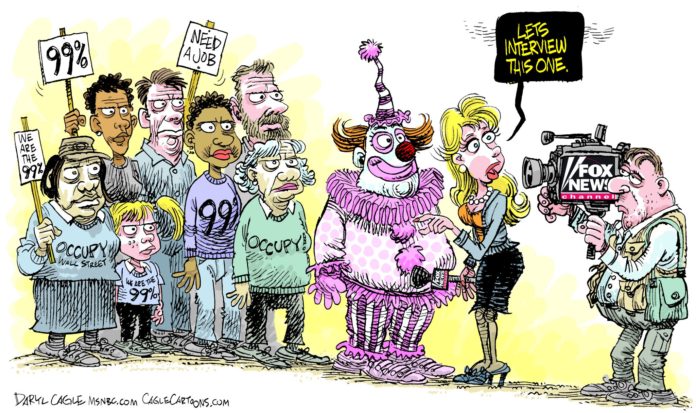BY RALPH NADER
March Madness comes once a year. Media Madness is year-round. What the mass media choose to cover and feature try to turn the priorities of any sane society upside down.
People of vice, war, money, spectator sports and business receive media attention – oftentimes ad nausem. People of virtue, peace, civics, health, labor and community engagement have to beg for media attention. Which of these two groups represents the most basic values of a civilized society that would restrain the excesses of the other group? You can guess!
There are many reasons for this chronic bias, beyond the power of commercial advertisers. The media believe that wrongdoing and greed and violence get readers and ratings while their opposites are dull soup.
But aren’t these opposites vital to the survival and well-being of a just society? Aren’t people who wage peace to prevent war, or demand health/safety over sickness/injury, more newsworthy when they expose people or companies that cause danger, damage and deaths?
Big-Time Greed is headline material, while Big-Time Thrift [e.g. efficiency for consumers] is boring, even when it concentrates on exposing Big-Time Greed. Aetna, Pfizer and avaricious middlemen are sometimes in the news when they exhibit gouging practices. But have you ever heard of Harvard researcher/lecturer Malcolm Sparrow, who for years has shown that at least 10% of your healthcare spending goes down the drain due to preventable, computerized billing fraud and abuse? That amounts to $270 billion this year alone!
When news editors are asked why the media overwhelmingly cover the utterances of warmongers like William Kristol [The Weekly Standard] but ignore peace-advocates like Coleman McCarthy [The Nation and Progressive Magazine], they respond that Kristol has more influence.
But who gave Kristol influence? Why, the media who quote and interview him incessantly. Coleman McCarthy, a formerly syndicated columnist for the Washington Post, works to have colleges and high schools around the country adopt peace studies. He could give a lively interview on Meet the Press or This Week on the superiority of waging peace over waging war in advancing national security in countries around the world.
The New York Times reports the crazed outbursts of bigots such as Ann Coulter and Pam Geller, even devoting entire pages, with numerous photographs, to both of them in one October 2010 Sunday edition. Yet the great labor advocate, writer and pamphleteer, Harry Kelber, has been on top of the most important worker-management issues of our time for a mere 75 years and remains unknown to New York Times readers, even though he resides in New York City, just like the Times.
These contrasts were at work at our Control the Corporation conference –held in Washington, DC earlier this month. The all-day event consisted of several panels on timely and important topics. The panelists discussed: how to counter the impact of corporate control of the electoral process, how to hold corporations accountable for their crimes, how to protect the “commons” from the insatiable advocates of privatization, what are future actions of the Occupy movement, how to create economic models and initiatives for creating jobs and raising the minimum wage, and what are the strategies to employ for mobilizing sustained action toward a more just democratic society.
The presenters were among the most experienced and articulate activists in the country regarding these important areas of American concerns. The media were informed in advance, yet no major news reporters, feature writers or columnists showed up.
Among the many leaders in fields of corporate injustice who spoke at the conference were: Harvey Wasserman, Rob Richie, Patrick Burns, Robert Weissman, Phineas Baxandall, David Morris, Wenonah Hauter, Jamie Love, Margaret Flowers, Greg LeRoy, Gayle McLaughlin, Michael Gecan, Russell Mokhiber, Chris Hedges and David Freeman.
Ever hear of them? Do you know how much better, safer, economically-secure, freer and more influential your lives would be were these and other civic leaders given print and airtime like the scoundrels and distracters that daily fill the screens and pages of newspapers, television and radio?
Well, visit the Center for Study of Responsive Law’s website for the concise biographies of the presenters and start following the great works of those who interest you.
Should you be interested in results beyond our borders, look up Jamie Love, the economist whose tireless global travels to less-developed countries exposed the prohibitive prices of AIDS drugs ]$10,000 per person per year] and led to his persuading Cipla, a drug company in India, to make and sell these drugs for $300 per person per year for AIDS patients in South Africa. More than any single person, his incisive advocacy and action coalitions broke the grip of the politically connected Big Pharma and overcame its determination that obscene profits on AIDS drugs must trump human lives.
A philosopher once said that we honor those we reward. Whom do we reward? Whom do we note? Business, sports and entertainment figures. The names of people advancing the great values of a society – like health, safety, clean elections – are largely unknown. The media like to trivialize, tantalize and entertain, but they rarely acknowledge those advancing solutions to our society’s most pressing problems. It is well beyond the time for the mass media to redefine what is important and get serious about very critical matters for this and future generations.
Nader.org








